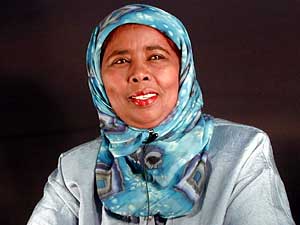|
Audio
Photos
Your Voice
|
The 'James Brown of Somalia:' Hibo Mohamed Nuur
April 8, 2003
For decades, Hibo Mohamed Nuur's legendary voice drew thousands to concerts from Mogadishu to Toronto. They still call her the James Brown of Somali music. But for the past few years, Nuur's lived in relative obscurity in Rochester. The Somali superstar is unrecognized by most people in her new home. The refugee life has little flash and glamor. But Nuur remains hopeful she'll sing again in Somalia.
Rochester, Minn. — These days Hibo Mohamed Nuur lives thousands of miles from where she was born, raised and achieved superstardom. Nowadays she can walk down a street in Rochester unrecognized. That is, until she runs into someone from Somalia.
She says her fans have been known to stop her everywhere from the grocery store to the street corner.
"They give me a paper to sign. They get very excited when they see me," she laughingly explains.
The reason is her music.
Nuur's voice soars over drums and pianos. Plaintive and controlled, Nuur sings a love story about a couple that reunite after 15 years apart.
Nuur became a household name in Somalia in the 1970s. She recorded dozens of live and studio albums. But with the fall of the Somali government in 1991, much of that work was destroyed.
|
Some of Somali people, they call me James Brown. Some Somali people they call me like Michael Jackson. They call me many names.
- Hibo Mohamed Nuur |
Today she can still be heard on bootlegged albums smuggled out of Somalia. The BBC and a radio station in the neighboring east African country of Djibouti also maintain an archive, and occasionally Nuur's music is broadcast on Middle Eastern radio stations. But Nuur receives no royalties from her years of work. Now, at age 50, she lives a carefully frugal life.
Abdullah Hared works at the Rochester Somali Resettlement office. He's a friend of Nuur's and helps to translate.
"She doesn't have anything. She's supposed to be wealthy at this time but she's not," says Hared.
Nuur shakes her scarf-covered head in agreement. She sits in the makeshift studio of Rochester Somali television, where she hosts a local program.
On this afternoon, Nuur records a series of promos telling viewers to tune in for BBC news and Somali entertainment.
Nuur comes from a prominent Somali family. Her father was a famous poet. Even so, Nuur's decision to become a singer was controversial. Abdullah Hared says that's because it challenged traditional gender roles.
"But when she became famous, when she became a celebrity, her family and all of Somalia recognized the position she's in," says Hared.
Still, Nuur says she's most frequently compared to famous male singers.
"Some of Somali people they call me James Brown, some Somali people they call me like Michael Jackson. They call me many names," says Nuur.
Nuur hopes to hit the road in the coming year with her second U.S. tour. She says there are pockets of Somali fans scattered across the country.
But Nuur says she's really waiting for peace to return to her homeland. When and if that happens, Nuur plans to be on the first plane back to Somalia. Then, she says, she'll give her most memorable performance yet.
|
News Headlines
|
Related Subjects
|

